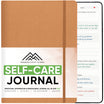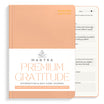In this comprehensive guide, we'll explore how to effectively use mood and habit trackers to enhance self-awareness, promote positive change, and cultivate a deeper sense of gratitude in our daily lives.
Understanding Mood and Habit Trackers
Mood trackers are tools that enable individuals to record and track their emotional states throughout the day, providing insights into mood patterns, triggers, and fluctuations. Habit trackers, on the other hand, help individuals monitor and track their daily habits, routines, and behaviors, facilitating accountability and consistency in goal pursuit.
Benefits of Using Mood and Habit Trackers
- Increased Self-Awareness: By regularly tracking your moods and habits, you develop a deeper understanding of your emotions, triggers, and behavioral patterns, allowing you to identify areas for growth and improvement.
- Promotion of Positive Change: Mood and habit trackers empower individuals to make positive changes in their lives by identifying areas where they can implement healthier habits, coping strategies, and self-care practices.
- Enhanced Accountability: Tracking your moods and habits holds you accountable for your actions and goals, motivating you to stay consistent and committed to your self-improvement journey.
- Improved Mental Well-Being: Engaging in regular reflection and self-monitoring through mood and habit tracking can have a positive impact on mental health, promoting mindfulness, stress reduction, and emotional regulation.
How to Use Mood and Habit Trackers Effectively
- Choose the Right Format: Select a format for your mood and habit tracker that aligns with your preferences and lifestyle, whether it's a physical journal, digital app, or spreadsheet.
- Establish Clear Goals: Before you begin tracking, define specific goals and intentions for your self-improvement journey, whether it's cultivating gratitude, increasing productivity, or fostering healthier habits.
- Be Consistent: Make tracking a daily habit by setting aside time each day to record your moods and habits. Consistency is key to gaining meaningful insights and tracking long-term progress.
- Use Descriptive Language: When recording your moods, use descriptive language to accurately capture your emotions and experiences. Consider keeping a mood journal to provide context and reflection on your mood patterns.
- Reflect Regularly: Take time to review your mood and habit tracker regularly to identify trends, patterns, and areas for improvement. Use this information to adjust your goals and strategies as needed.
Cultivating Gratitude Through Mood and Habit Tracking
One powerful way to incorporate gratitude into your self-improvement journey is by using your mood and habit tracker to record moments of gratitude and appreciation each day. Whether it's jotting down three things you're grateful for or reflecting on positive experiences, integrating gratitude into your tracking practice can enhance your overall sense of well-being and fulfillment.
Mood and habit trackers are invaluable tools for promoting self-awareness, accountability, and positive change in our lives. By incorporating gratitude into your tracking practice and consistently reflecting on your emotions and behaviors, you can cultivate a deeper sense of appreciation for life's blessings and enhance your overall quality of life. So start tracking today and embark on a journey of self-discovery, growth, and gratitude.




















Leave a comment
All comments are moderated before being published.
This site is protected by hCaptcha and the hCaptcha Privacy Policy and Terms of Service apply.